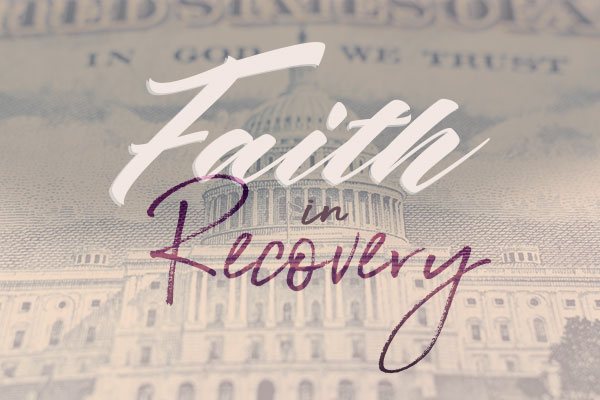
Faith in Recovery Pt. 6: Should the Government Fund Faith-Based Rehabs?
- By WRN Editorial Staff --
- 30 Aug 2017 --

The Supreme Court ruled in 2000 the government can directly fund religious groups, as long as the money is used for secular programs.
“The care of human life and happiness, and not their destruction, is the first and only object of good government.”
Thomas Jefferson
In 2017, the United States federal government will spend nearly $700 million dollars on drug treatment and prevention. When isolated this may seem like a high figure. However, in comparison, all of the effects of illicit substances on budgets through the War on Drugs, health care, crime, etc. costs taxpayers cost taxpayers $442 billion dollars annually.
Should the Government Fund Faith-Based Programs?[/tweetthis]

America’s strategy to overcome substance addiction has been two-fold. First, they attack the supply and distribution of illicit substances, then they help deal with the demand of drugs and expand access to treatment programs. The elimination of supply through the War on Drugs has failed in its objectives and in some cases can be counterproductive. The treatment of addiction has shown to be generally more effective in decreasing addiction rates. For the first time, “the administration proposed more funding for demand reduction efforts than those focused on supply reduction” for fiscal year 2017. This becomes of increasing importance as the opioid epidemic is declared a national emergency (if the paperwork is filed).
But which programs get chosen for funding? Does the United States give more money to secular or faith-based programs? Should the United States government give money for faith-based programming?
As WRN reported earlier in our Faith in Recovery series, government funding for religious addiction treatment programs took a momentous turn during the Presidency of George W. Bush. His faith-based initiatives eliminated restrictions on government contracts and funding for religious organizations involved in social services.
Read the previous articles in this series: Faith in Recovery
President Obama expanded on these initiatives and currently over half of all federal funding for treatment programs goes to faith-based programs. This is not considered a violation of church and state. The Supreme Court ruled in 2000 the government can directly fund religious groups, as long as the money is used for secular programs.
The Advantages of Government Funding for Faith-Based Groups
Why does the government fund faith-based programs? Initially, it was criticized as a way to gain political support among evangelical groups. But, as WRN stated in previous articles there are advantages of faith-based programs. They have been shown in some cases to increase the effectiveness of eliminating addiction, and help build on the personal faith of participants.
Faith-based programs also provide other unique benefits. The number of volunteers that work for religious organizations makes them more cost effective and more comprehensive than some secular programs. The Exodus Project, a religious study and addiction treatment program in Arkansas, has zero participants return to prison upon release. In a state where there is a 42% recidivism rate within 3 years and 70% of the population are “highly religious,” this seems like an appropriate investment of government funds.
In a country where the majority of individuals identify as religious, it seems to make sense to create programs that build upon that faith. 84% of clients in counseling treatment programs polled wanted spirituality in their treatment. Additionally, the most popular programs in the United States are based on religious principles. A study done in 2010 argued that the spirituality or spiritual awakening or a participant was one of the greatest factors in substance abstinence at the one-year mark. This is significant because 40%-60% of addicts relapse within 6 months.
The possibility exists that government funding can be used to influence programs to follow guidelines on providing up-to-date medical and therapeutic techniques to complement any religious instruction. Rather than allowing programs that might emphasize religion as the sole methodology for relieving addiction, using government funding with strings attached based on credentials can provide a positive influence on these existing programs.
The Disadvantages of Government Funding for Faith-Based Groups
The first issue is that although there is the possibility of government oversight being used in religious programs, in practice it does not occur. In fact, there are numerous examples of a lack of oversight and certification required for treatment programs that use faulty techniques that may do more harm than good.
It also hurts the potential for the building of new programs. We have reported that the effectiveness of faith programs is not beyond reproach. In addition, there are programs in Europe that use a combination of prescription drugs and cognitive therapy that have high success rates that operate at the fraction of the cost of treatment in the United States. Putting more money into pilot programs in the United States could lower costs (the average being around $40,000) and develop treatments that may prove to be more effective than the inclusion of religion.
The second is that the dominance of government funding has created opportunity costs for secular programming in specific geographic areas. As we reported in our last article, a large percentage of prison or parole-based treatment programs are exclusively religious. This means an inmate might only have the option of choosing a program that is less likely to work or feel uncomfortable in a program that emphasizes religious conversion as well as sobriety. One could argue that this violates the religious freedom of individuals.
Both individuals and atheist groups have sued state governments for only allowing them access to private, religious programs. There have been protests that faith-programs are exempt from religious discrimination laws. They can pick employees based on their religion and pay them using government funds. Presidents Bush, Obama, and Trump have not approached this as an issue, meaning that potentially qualified individuals could be excluded. In addition, this creates one of the concerns of the separation of church and state, that religious discrimination can be tacitly supported by government money.
Read the previous articles in this series: Faith in Recovery



















